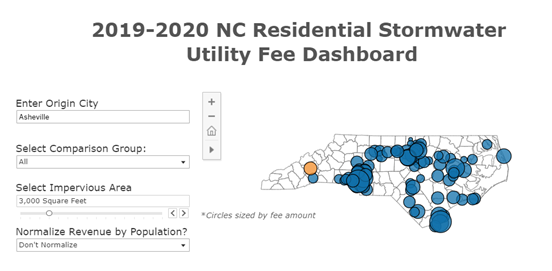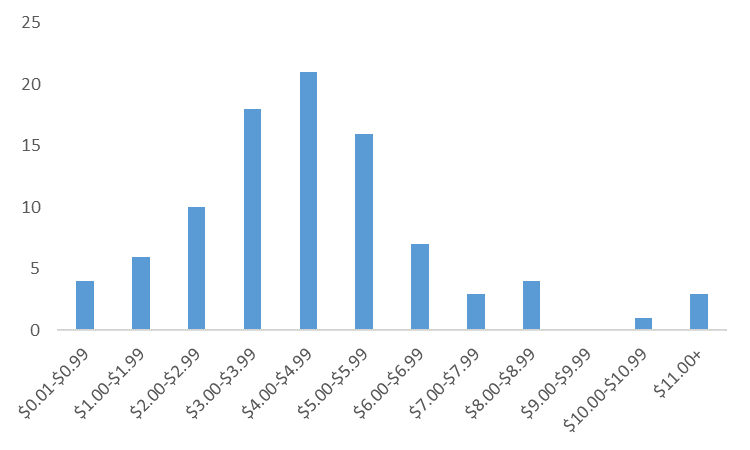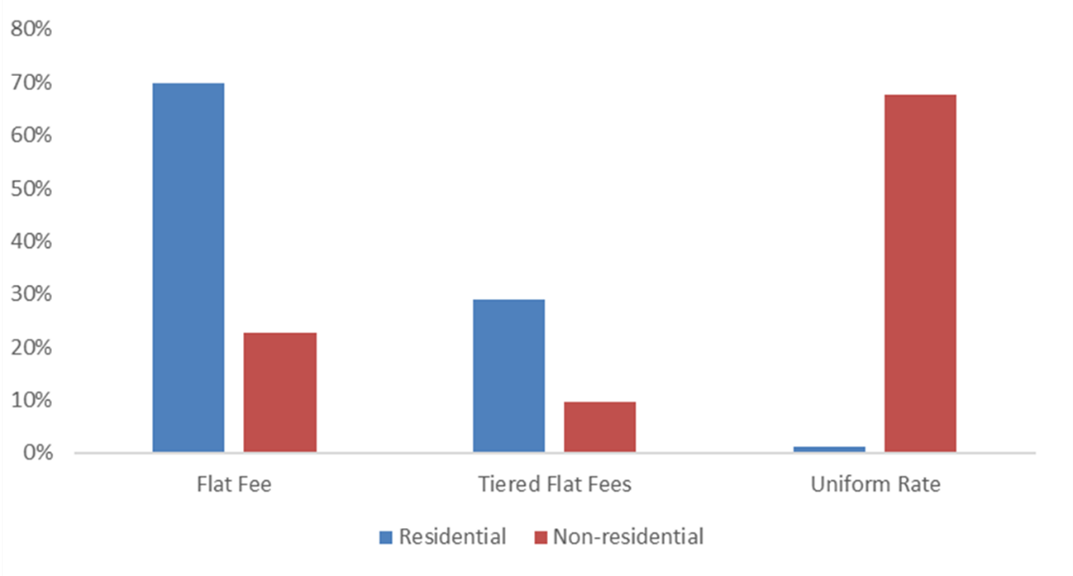The Environmental Finance Center has completed the 2020 North Carolina Stormwater Fee Survey. The survey includes 93 stormwater fee structures effective July 1, 2019. There are 6 utilities in this year’s survey that were not in last year’s survey. Additionally, there is one fee structure that is not included this year as the city of New Bern dissolved their stormwater fee after the 2019 fiscal year.
The Residential Stormwater Utility Fee Dashboard has been updated! Use the comparison groups on the left side of the Dashboard to compare stormwater fees by region, by NPDES MS4 permit designation, and by similar population. You can also download our tables of stormwater fees and fee structures to analyze stormwater fees for residential, non-residential, and multifamily customers.

New to stormwater fee structures? Check out our blog from 2017 which covers a lot of the stormwater lingo that this blog will cover.
Fees and Fee Structures Summary Update
Residential Bill Amounts
The average bill for a residential property with 3,000 square feet of impervious surface is $4.51 monthly. Monthly residential bills at 3,000 square feet range from $0.50 to $15.44. Below is the distribution for residential stormwater monthly bills at 3,000 square feet of impervious.

Non-residential Bill Amounts
The average monthly bill across surveyed utilities for a non-residential property with 10,000 square feet of impervious surface was $15.07 monthly. Monthly bills at 10,000 square feet range from $0.72 to $72.50 monthly.
Intuitively, there is higher variation in the stormwater monthly bills for non–residential properties than residential properties. While the standard deviation of residential bills at 10,000 square feet of impervious is $5.59, the standard deviation of non-residential bills at 10,000 feet of impervious is $11.46. This is due to the high number of flat fee structures for residential customers, resulting is less variation.
Fee Structures
The 93 residential stormwater fee structures in this survey included 65 flat fee structures, 27 tiered flat fee structures, and one uniform rate (per ERU) fee structure. The 93 non-residential fee structures included 63 uniform rate (per ERU) structures, 21 flat fee structures, and 8 tiered flat fee structures.
Of the 21 utilities that charge non-residential customers a flat fee, 14 charge non-residential properties the same flat fee as residential properties. For these utilities, residential customers pay the same monthly bill as non-residential customers, regardless of the size of the non-residential property. The graph below shows the distribution of fee structures by customer type for this year’s survey.

NPDES MS4 Permits
Of the 107 municipalities in North Carolina that have MS4 permits, 74 (69 percent) have stormwater fees. This year’s survey includes 19 utilities with no MS4 permit, 6 utilities with Phase I MS4 permits, and 68 utilities with Phase II MS4 permits. NPDES permits require municipalities to implement minimum control measures (MCMs) including public education, public involvement, and illicit discharge detection. Check out our blog to see a closer look at MS4 audit trends in North Carolina.
Wondering why municipalities and counties with no MS4 permit choose to charge a stormwater fee? In some cases, stormwater utilities with no MS4 permit are in areas that have other stormwater-related regulatory drivers like the Falls Lake rules, the Jordan Lake rules, and state TMDL designations. In other cases, utilities may be facing water quantity challenges related to flooding.
The table below shows the median monthly residential bills at 3,000 square feet of impervious surface by MS4 designation. Phase I utilities have the highest median bill while utilities with no MS4 permit have the lowest median bill.

December Stormwater Finance Workshop
The Environmental Finance Center will host a stormwater finance workshop at the UNC School of Government in December. CPE and PDH credits are available. Stay tuned for registration info and the exact dates and times. We look forward to seeing you at this year’s workshop! Check out our workshop landing page for last year’s presentation material.
Evan Kirk has been with the EFC since 2016. He graduated from UNC in 2016 with a BS in Environmental Science and later earned a master’s certificate in GIS from the Department of Geography at UNC in 2017. Evan earned a masters in city and regional planning with a concentration in land use and environmental planning from UNC in 2019. In his current role as project director, he conducts applied research on water, wastewater, and stormwater finance topics and administers technical assistance and trainings for small systems.

